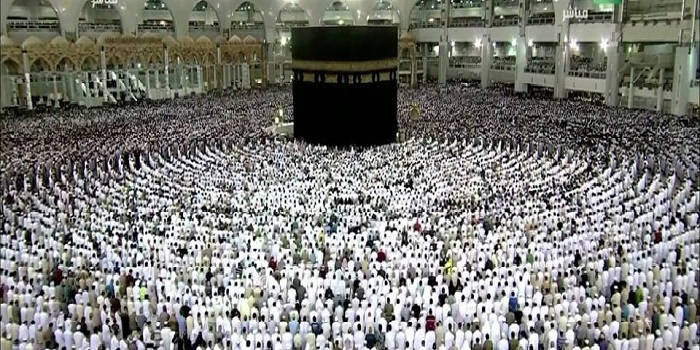A suicide bomber allegedly blew himself up near the Grand Mosque in Makkah as police disrupted a plot to target the holiest site in Islam just as the fasting month of Ramadan ends, Saudi security forces said Saturday.
The Interior Ministry said it launched a raid around Jeddah, as well as two areas in Makkah itself, including the Ajyad Al-Masafi neighbourhood, located near the Grand Mosque.
There, police said they engaged in a shootout at a three-story house with a suicide bomber, who blew himself up and caused the building to collapse. He was killed, while the blast wounded six foreigners and five members of security forces, according to the Interior Ministry’s statement. Five others were arrested, including a woman, it said.
Saudi state television aired footage after the raid Friday near the Grand Mosque, showing police and rescue personnel running through the neighbourhood’s narrow streets. The blast demolished the building, its walls crushing a parked car. Nearby structures appeared to be peppered with shrapnel and bullet holes.
The Interior Ministry said the thwarted “terrorist plan” would have violated “all sanctities by targeting the security of the Grand Mosque, the holiest place on Earth.”
“They obeyed their evil and corrupt self-serving schemes managed from abroad whose aim is to destabilize the security and stability of this blessed country,” it said.
The ministry did not name the group involved in the attack. The ultraconservative Sunni kingdom battled an al-Qaida insurgency for years and more recently has faced attacks from a local branch of the Islamic State group. Neither group immediately claimed involvement, though IS sympathizers online have urged more attacks as an offensive in Iraq slowly squeezes the extremists out of Mosul and their de facto capital of Raqqa in Syria comes under daily bombing from a U.S.-led coalition.
The disrupted attack comes at a sensitive time in Saudi Arabia. King Salman earlier this week short-circuited the kingdom’s succession by making his son, Defense Minister Mohammed bin Salman, first in line to the throne.
The newly appointed 31-year-old crown prince is the architect of Saudi Arabia’s stalemated war in Yemen against Shiite rebels. He has also offered aggressive comments about the kingdom confronting Shiite power Iran.
Iran’s Foreign Ministry on Saturday condemned the Mecca plot and said it remains willing to work with other countries in confronting terrorism.
According to Aljazeera, Since late 2014, Saudi Arabia has faced periodic bombings and shootings claimed by the Islamic State of Iraq and the Levant (ISIL, also known as ISIS) group.
Four people were killed last year, days before the end of Ramadan in an explosion close to Islam’s second holiest site, the Prophet’s Mosque, in the city of Medina,
It was one of three suicide blasts around the kingdom on the same day and which the US Central Intelligence Agency said bore the hallmarks of ISIL.
[Source: Associated Press and Aljazeera]





 WhatsApp us
WhatsApp us 


1 comment
From the English translation of the Jāmi’ At-Tirmidhī, translated by Abū Khaliyl, Ahādith edited and referenced by Hāfiz Abū Ṭāhir Zubair ’Ali Za’i; Volume 2, Book 7: The Chapters on Ḥajj from the Messenger of Allāh , Chapter 1: ‘What Has Been Related about Makkah’s Sanctity’, Ḥadīth Number 809:
Sa’eed bin Abī Sa’eed Al-Maqburī narrated: “Abū Shuraiḥ Al-’Adawī said that when ’Amr bin Sa’eed was sending troops to Makkah, he said to him: ‘0 Amīr! Allow me to tell you what the Messenger of Allāh said on the day following the Conquest of Makkah. My ears heard it, my heart understood it thoroughly, and with my own eyes, I saw the Prophet when he – after glorifying and praising Allāh – said: “Indeed Allāh, the Most High, made Makkah a sanctuary, it was not made a sanctuary by the people. So it is not lawful for a man who believes in Allāh and the Last Day to shed blood in it, nor to cut down its trees. If anybody tries to use the Messenger of Allāh to make an excuse for fighting in it, then say to him: ‘Indeed Allāh permitted His Messenger and He did not permit you.’ Allāh only allowed it for me for a few hours of one day, and today its sanctity has returned as it was before. So let the one who is present convey to the one who is absent.” Abū Shuraiḥ was asked: “What was ’Amr bin Sa’eed’s reply to you?” He said: “I am more knowledgeable about that than you Abū Shuraiḥ! The Ḥaram does not give protection to a disobedient person, nor a person fleeing for murder, nor fleeing for (Kharbah) lawlessness.”“ (Ṣaḥīḥ)
Abū ’Eīsā said: It has been reported as: “(Nor fleeing for) atrocities (Khizyah).” There are narrations on this topic from Abū Hurairah and Ibn ’Abbās.
Abū ’Eīsā said: The Ḥadīth of Abū Shuraiḥ is a Ḥasan Ṣaḥīḥ Ḥadīth.